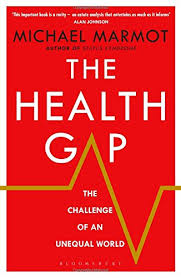 I’ve been reading some interesting books and so thought I’d start sharing specific books on a regular basis. First up is The Health Gap: The Challenge of an Unequal World by Sir Michael Marmot, President of the World Medical Association. I heard him speak on NPR and immediately bought this book.
I’ve been reading some interesting books and so thought I’d start sharing specific books on a regular basis. First up is The Health Gap: The Challenge of an Unequal World by Sir Michael Marmot, President of the World Medical Association. I heard him speak on NPR and immediately bought this book.
Rather than do an analysis, I thought I’d share some quotes from the book. It is an easy if occasionally discomfiting tome.
On page 30, he quotes an alternative ten top tips for health compiled by David Gordon & colleagues at University of Bristol.
- Don’t be poor. If you can, stop! If you can’t, try not to be poor for long.
- Don’t live in a deprived area. If you do, move.
- Don’t be disabled or have a disabled child.
- Don’t work in a stressful, low-paid manual job.
- Don’t live in damp, low-quality housing or be homeless.
- Be able to afford to pay for social activities and annual holidays.
- Don’t be a lone parent.
- Claim all benefits to which you are entitled.
- Be able to afford to own a car.
- Use education to improve your socioeconomic position.
(Easier said than done.)
Page 53: Most of us cherish the notion of free choice, but our choices are constrained by the conditions in which we are born, grow, live , work and age. How far we accept constraints on behavior varies.
Page 60: The smaller the dress size the larger the apartment. This received in wisdom in New York sums it up: there is a social gradient in obesity. Particularly among women in middle-income and high-income countries, the lower the status, the greater the obesity. But why?
Page 86: Where people do not have money, money is the wrong unit of measurement to assess value. And where they do have money, it still may be the wrong unit.
Page 119: Adverse experiences tend to cluster.
Page 179: It is entirely possible, and desirable, to run profitable companies that do not pursue profit at the expense of the physical and mental health of employees.
Marmot talks about not being empowered at work and not being appropriately rewarded as having harmful impact of physical and emotional health.
Page 178: Unemployment is particularly bad for mental health. Some of our politicians claim that unemployment is a lifestyle choice. If so, it is an odd one as it puts people at increased risk of depression and suicide.
Page 231: Good urban design allows social interaction. Affordable public transport enables people old and young to be socially active….Crime is a public health issue…fear of crime.
Sir Marmot gives lots of examples from countries around the world where lots of different programs to address various inequities are working. I recommend you read this book to find them out.
Next up (in a few weeks or however long it takes me to finish): Inventology: How We dream Up Things that Change the World by Pagan Kennedy.

Thanks for sharing the quotes from Michael Marmot’s book. I will definitely read it. While I can already gather & agree with his observations about the connections between health & poverty, how does society, especially poor people, get out of this horrible quagmire?